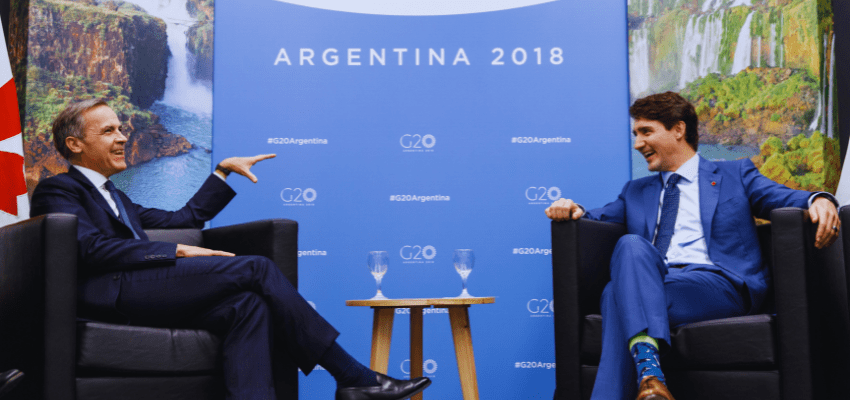This article originally appeared in the Hub.
By Fen Osler Hampson and Tim Sargent, October 21, 2024
Dear prime minister, as chair of your task force on economic growth, it is my responsibility to share with you some hard home truths about what we must do to get our economic house in order. We have a growth problem that is getting worse. At its root is weak private sector investment, particularly in the manufacturing and resource sectors.
Canada is vastly underperforming compared to its economic peers. Per capita output, a key measure of our productivity—continues to fall. The average per capita income in Canada today is only what it was ten years ago when the Liberal government came to power. The median wages of Canadians have been stuck in neutral since the late 1970s, which is why most households now require two incomes to pay the bills and struggle to get by. The wealth gap between us and our American neighbours has grown. In 2002, our per capita GDP was roughly 80 percent that of the U.S.—a 20 percent spread—but the difference is now a whopping 30 percent.
As Carolyn Rogers, Canada’s deputy governor of the Bank of Canada, starkly pointed out earlier this year, Canada has to raise labour productivity, increase capital intensity (i.e., give workers better tools so they can be more productive), and ensure that people have the right skills and training for their jobs, all while using capital and labour together more efficiently.
That’s no small order. So, to riff off Vladimir Lenin, “What is to be done?”
First off, you cannot have an economic policy based on costly subsidies and redistributive measures (such as excessive capital gains taxes, high marginal tax rates, and ever-increasing outlays on new social programs). When Ottawa is spending more than 40 percent of the country’s GDP (tax expenditures and price regulation bump that number up to two-thirds of GDP), you have an inverted economic pyramid that cannot sustain growth.
Just as the Liberal government did in 1995 when Jean Chrétien was prime minister, we must drastically change economic course.
If we don’t, Canada will suffer the same fate as the United Kingdom in the 1970s (or even today, when things actually may be worse) or France, which until recently was the sick man of Europe. We will face rising unemployment, lagging competitiveness, anemic growth, and falling incomes.
Second, the federal government and the private sector must stick to their lanes. Canada’s economy today is too big, complicated, and fast-paced for Ottawa to “manage” and “direct.” Ottawa’s challenge is to deliver on its core responsibilities (such as defence, foreign policy, immigration, justice, etc.) while creating a hospitable environment that encourages the private sector to invest. Period.
That means we must reduce the tax burden on corporations and individuals, among the highest in the industrialized world.
We also must lessen the regulatory overburden. Canada’s overly complicated and lengthy regulatory processes for new project approvals, drug approvals, etc., along with interprovincial trade barriers, are stifling investment and growth.
The private sector will only invest if Canada’s tax system encourages investment, and its regulatory system is not too burdensome. We should follow the examples of Ireland or France under Macron, which have cut business taxes, created an attractive environment for investors and entrepreneurs, and accordingly boosted productivity and growth.
Third, if the government wants to find new sources of tax revenue without, at the same time, increasing the burden on the middle class, it should plug a gaping hole in our current tax regime by going after those who aren’t paying anything.
It is no accident that Canada has one of the highest ratios of nonresident citizens in the world—roughly 11 percent of the population, or more than 4 million Canadians, live abroad. That number includes some of Canada’s wealthiest families who have moved their investment holdings offshore and are nonresidents for tax purposes but remain Canadian citizens.
In going after those who arbitrage our tax laws with respect to citizenship, Canada should align its income tax policies and reporting requirements with those of the U.S., which requires all U.S. citizens, whether they are residents or nonresidents, to file and pay taxes on their worldwide sources of income. That will generate additional revenue and help reduce the burden on those Canadians who pay their taxes.
The government also needs to go after the underground economy, which has been snowballing and accounts for nearly 3 percent of total GDP according to conservative government estimates, but some experts argue that it is much bigger.
Residential construction is the largest contributor to the underground economy, followed by retail trade, accommodation, and food services. As Canada stands on the cusp of a massive residential construction boom supported by a significant infusion of federal funds, this sector—and the potential losses to tax evasion—will almost certainly grow.
Fourth, Ottawa must stop wasting billions in corporate subsidies and innovation “superclusters.” These programs have done little to boost Canada’s productivity. As critics rightly point out, “Innovation programs…have been overly politically driven with an attempt to cover too many regions and sectors and designed by bureaucrats with outdated or underdeveloped notions.”
We should know by now that governments can’t pick corporate winners, but losers can certainly pick their governments.
Does this mean Ottawa should eschew any role in economic policy? No, it does not. However, that role should be limited, based on careful strategic considerations, when an urgent and pressing requirement exists. NATO recently asked its members to quickly develop national plans to bolster the capacity of their defence industrial and materiel sectors in response to rapidly increasing global geopolitical tensions. This is an area where it makes obvious sense for the government—as the primary customer for defence goods and services—to develop a closer relationship with the private sector. Canada should develop an “across-the-board plan to fully mobilize the country, federal institutions, and the economy to fight a conventional war.”
Our course, to achieve this, we would first need to fix our dysfunctional defence procurement system. However, the defence sector is well-paying, and an area where Canada has historically had a lot of strengths. It’s absolutely vital that the government—and the federal bureaucracy—work together with the sector to create a coherent and effective industrial policy.
To make Canada genuinely competitive in today’s global economy and make Canadians prosperous and secure, you will have to do some things that no government wants to do. But this is no time for complacency: our economy is in real trouble and time is short if we are going to turn things around before the next election.
Fen Osler Hampson is the Chancellor’s Professor & Professor of International Affairs, Carleton University.
Tim Sargent is a CIGI Distinguished Fellow and former Deputy Minister of International Trade and former Associate Deputy Minister of Finance.







